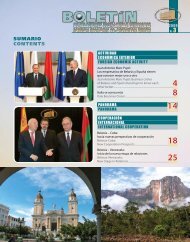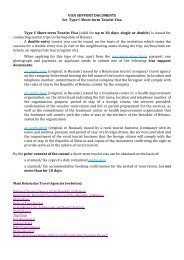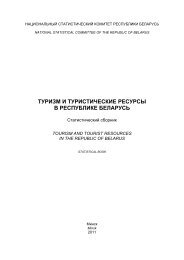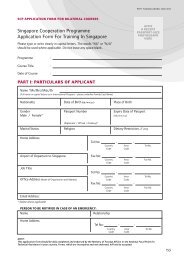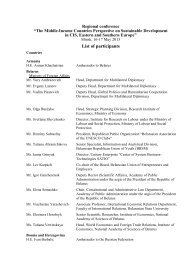International governanceis increasingly influencedby a multitude of voicesand actors throughglobal movementsand transnationalactivist networksdeveloping countries. Developed countriesshould welcome these changes, as the successof the South extends benefits to the North andadvances the prosperity of all.Indeed, some intergovernmental processeswould be invigorated by greater participationfrom the South, which can bring substantialfinancial, technological and human resources.Emerging economies could lead in achievingthe Millennium <strong>Development</strong> Goals, innovatingin climate change mitigation and concludingthe Doha development round.Global organizations that are more representativeof the world’s countries would inprinciple be accountable to the world’s peoplethrough national governments. However, statemediation alone is inadequate. Internationalgovernance is increasingly influenced bya multitude of voices and actors throughglobal movements and transnational activistnetworks. Indeed, this has been the thrust ofantiglobalization movements, sometimes selfdescribedas “global democracy” movements,which cut across a range of issues, articulate diverseconcerns and embrace an almost endlessvariety of political messages but share the basicconcern of making transnational power andgovernance accountable to civil society.To this end, today’s multilateral institutionsare encouraged to recalibrate their representationand guiding principles, in areas such as:• Voice. Matching the circles of stakeholdersand decisionmakers so that all have an effectivevoice in global matters that concernthem.• Public goods. Building bridges across organizationallines to facilitate the multilevel,multisector, multiactor production thatmany global public goods require.• Leadership. Encouraging global leaders, stateand nonstate, individually or collectively, toexercise leadership to assist the internationalcommunity on issues that are caught inglobal policy stalemates and problems thatare reaching crisis proportions.• Convening. Realigning existing organizationsto reflect changing global economic andpolitical realities, and vesting them with theauthority and expertise to effectively mediateamong different stakeholders.• Information and resources. Helping poorercountries in the South participate moreeffectively in global governance through betteraccess to information, technical assistanceand finance.• Citizen participation. Drawing on the wealthof ideas and views emerging from citizennetworks and from participants previouslysidelined from the global discourse.International organizations are becomingmore inclusive and sensitive to the requirementsof a rapidly changing world. The UnitedNations Economic and Social Council, forexample, has established the <strong>Development</strong>Cooperation Forum to promote more broadbaseddiscussion of development assistance.There is scope for renewed multilateralism.However, there have been only modest governancereforms at the International MonetaryFund (IMF) and the World Bank. The UnitedNations Security Council’s core structure remainsunchanged, despite decades of debate.More-determined reform is needed for multilateralinstitutions to facilitate cross-nationalcollaboration on stalemated global issues inways viewed as fair and just by all countries.Global civil societyInternational governance institutions can beheld to account not just by member states, butalso by global civil society, which can shape theexercise of power and act as a countervailingforce to states and markets. All kinds of voluntaryassociations—including nongovernmentalorganizations, social movements, advocacygroups, unions and community groups—haveused channels of influence such as elections,lobbying, media and public campaigns to becomedrivers of social change within many leadingcountries of the South—including Brazil,Egypt, India and South Africa. In the Indianstate of Kerala a rich history of civic engagementinfluenced the government to prioritizeextensive social rights and equity- promotingpublic policies. In Brazil, the Sanitarista movementof health care professionals played acentral role in developing the country’s publichealth care system and expanding services tothe poor. 24National civil society groups are increasinglyusing their experience engaging with nationalgovernments to open up independent networks110 | HUMAN DEVELOPMENT REPORT <strong>2013</strong>
of North–South and South–South dialoguesoutside traditional official internationalgovernance channels. These transnationalnetworks are laying the groundwork for anemerging global civil society that is pushing foraction on issues ranging from climate change tomigration policy to human rights.The potential for global civil society to influencedecisionmaking on critical global issueshas been greatly magnified by the Internetrevolution, which enables hyperconnectivityof disparate groups and offers platforms forcitizens’ ideas and concerns to spread rapidlyaround the globe. People can speak to people,and communities of scientists and other professionalscan share ideas, unmediated by statepower or markets. This new ease of global communicationis fuelling creative partnerships,empowering individuals and social organizations,leading to new forms of solidarity andallowing people to interact and express theirvalues internationally.The recent uprisings in several Arab Statescountries, the culmination of complex historicaldevelopments, have shown that socialmedia is a force that world leaders and globalinstitutions ignore at their peril. The rapidspread and wide response to the video Kony2012, about indicted war criminal JosephKony of the Lord’s Resistance Army, showedthat social media can engage many millions ofpeople in discussion of important issues withindays. 25 There may be disagreement over the legitimacyof particular concerns and platforms,but the rapid sharing of information acrosssocial networks clearly sways public opinionon issues that matter to the global citizenry andultimately influences international governance.Indeed, one of the most valuable tools ofglobal civil society is the ability to diffuse newnorms that transform the behaviour of state andprivate actors. By taking up and framing issuesand pressuring states, civil society networkscan put new issues on the table and influencegovernment and international action towardsnew treaties, stronger enforcement mechanismsand even direct intervention. Classic examplesof civil society influence on global normsinclude the global diffusion of the women’ssuffrage movement, the antislavery movementand the Red Cross movement that led to theproduction of the Geneva conventions and theInternational Federation of the Red Cross andRed Crescent Societies. More recently, globalcivil society networks have been influential ininstitutionalizing anti–land mine legislation,more open access to AIDS medicines and campaignsopposing violence against women.While global civil society holds muchpotential for influencing international governancenorms and decisionmaking, the likelycontribution of civil society organizationsand transnational networks should be kept inperspective. Higher levels of resourcing leadthe international nongovernmental organizationsof the North to wield disproportionateinfluence in the global civil society space. 26The international human rights regime, forexample, often emphasizes civil and politicalrights, which are of particular concern to civilsociety in Eastern Europe, rather than socialrights, which figure much more centrally inthe demands of popular movements in theSouth. Limitations on civic space as well asother constraints can affect the capacity of civilsociety organizations to function. 27 A furtherconsideration is one of transparency, as itcan be unclear how autonomous civil societygroups are from state and market forces. Whencivil society organizations become extensionsof state power, economic influence or traditionalauthority, civil society activity maymagnify rather than reduce inequalities andinstability. 28The future legitimacy of internationalgovernance will depend on the capabilities ofinstitutions to engage with citizen networksand communities—understanding their concernsand borrowing from their ideas and approachesto find direction for their own effortsand energies. Such engagement will maximizethe legitimacy of their actions and ensure accountabilityto the citizens of member states(box 5.2). The idea of ecological citizenship, forexample, may be a promising way to constructfrom the ground up global public opinion onthe provisioning of global public goods. 29To be effective, international organizationsneed to form productive partnerships with socialmedia communities and nongovernmentalorganizations in the South and North alike.They should engage with citizen groups to supportpolicy changes and a transition towardsmore-equitable principles and institutions ofGlobal civil society hasthe ability to diffuse newnorms that transformthe behaviour of stateand private actorsChapter 5 Governance and partnerships for a new era | 111
- Page 1 and 2:
WNSEHuman DevelopmentReport 2013The
- Page 3 and 4:
Human Development Report 2013The Ri
- Page 5 and 6:
Human Development Report 2013 TeamD
- Page 7 and 8:
Finally, the Report also calls for
- Page 9 and 10:
Heather Simpson, Ben Slay, Mounir T
- Page 11 and 12:
3.6 India’s Supreme Court issues
- Page 13 and 14:
OverviewOne of the most heartening
- Page 15 and 16:
and sustainability are fully incorp
- Page 17 and 18:
Without investment in people, retur
- Page 19 and 20:
opportunity to reap the full benefi
- Page 21 and 22:
Woods institutions, the United Nati
- Page 23 and 24:
IntroductionWhen developed economie
- Page 25 and 26:
leading economies—Brazil, China a
- Page 27 and 28:
comparable access to information, e
- Page 29 and 30:
mobile phones: cellular banking is
- Page 32 and 33:
“The political problem ofmankind
- Page 34 and 35:
BOX 1.1Fairness, macroeconomics and
- Page 36 and 37:
BOX 1.3Amartya Sen, Nobel Laureate
- Page 38 and 39:
FIGURE 1.1Income per capita is risi
- Page 40 and 41:
BOX 1.4Subjective indicators of wel
- Page 42 and 43:
FIGURE 1.4There is notable variatio
- Page 44 and 45:
FIGURE 1.6Most regions show declini
- Page 46 and 47:
Progress in humandevelopment achiev
- Page 48 and 49:
BOX 1.7Social competencies: human d
- Page 50 and 51:
TABLE 1.3Inequality and satisfactio
- Page 52 and 53:
Not all countries havethe precondit
- Page 54 and 55:
“When the music changes,so does t
- Page 56 and 57:
BOX 2.1The South’s integration wi
- Page 58 and 59:
FIGURE 2.1As a share of world merch
- Page 60 and 61:
BOX 2.2Acquisitions by the South of
- Page 62 and 63:
FIGURE 2.3Between 2000 and 2010, In
- Page 64 and 65:
FIGURE 2.4Export earnings per capit
- Page 66 and 67:
BOX 2.6Final assembly is about more
- Page 68 and 69:
Instead of having a centreof indust
- Page 70 and 71:
FIGURE 2.6Emerging market economies
- Page 72 and 73: Developing countriestrade more amon
- Page 74 and 75: “We cannot expect thatall nations
- Page 76 and 77: TABLE 3.1Selected developing countr
- Page 78 and 79: A common featureof countries thatha
- Page 80 and 81: More important thangetting prices r
- Page 82 and 83: BOX 3.5Eastern Europe and Central A
- Page 84 and 85: States have to beconscious that the
- Page 86 and 87: As countries develop,they tend to d
- Page 88 and 89: Having weathered theAsian financial
- Page 90 and 91: Providing publicservices that contr
- Page 92 and 93: Advancing health requiresmore than
- Page 94 and 95: Universal public healthand educatio
- Page 96 and 97: • China. The Minimum Livelihood G
- Page 98 and 99: “Each generation will reap whatth
- Page 100 and 101: concerns will make for a complex en
- Page 102 and 103: A greater emphasison education cans
- Page 104 and 105: FIGURE 4.1Under the fast track scen
- Page 106 and 107: Around the worldpeople are calling
- Page 108 and 109: FIGURE 4.4Different environmental s
- Page 110 and 111: FIGURE 4.5Education policies can al
- Page 112 and 113: BOX 4.2China and Ghana: who benefit
- Page 114 and 115: FIGURE 4.8countries thus converge t
- Page 116 and 117: “Let us join hands to try tocreat
- Page 118 and 119: Areas of globalinternational concer
- Page 120 and 121: Addressing climatechange requires t
- Page 124 and 125: BOX 5.2Jo Leinen, Member of the Eur
- Page 126 and 127: facilitates reserve investments and
- Page 128 and 129: Responsible sovereigntytakes the lo
- Page 130 and 131: FIGURE 5.1Under the accelerated pro
- Page 132 and 133: Good policymakingrequires greater f
- Page 134 and 135: A fair and less unequalworld requir
- Page 137 and 138: NotesOverview1 Atsmon and others 20
- Page 139 and 140: 25 Blinder 2006.26 UNIDO 2009.27 UN
- Page 141 and 142: which is 61.7 deaths per 1,000 live
- Page 143 and 144: ReferencesAbdurazakov, A., A. Minsa
- Page 145 and 146: urban_world_cities_and_the_rise_of_
- Page 147 and 148: Kamau, P., D. McCormick, and N. Pin
- Page 149 and 150: Labor Administration. Geneva: Inter
- Page 151 and 152: Human Development Report 2013The Ri
- Page 153 and 154: Statistical acknowledgementsThe Rep
- Page 155 and 156: Key to HDI countries and ranks, 201
- Page 157 and 158: Human Development Report 2013The Ri
- Page 159 and 160: Human Development Report 2013The Ri
- Page 161 and 162: Human Development Report 2013The Ri
- Page 163 and 164: Human Development Report 2013The Ri
- Page 165 and 166: Human Development Report 2013The Ri
- Page 167 and 168: Human Development Report 2013The Ri
- Page 169 and 170: Human Development Report 2013The Ri
- Page 171 and 172: Human Development Report 2013The Ri
- Page 173 and 174:
Human Development Report 2013The Ri
- Page 175 and 176:
Human Development Report 2013The Ri
- Page 177 and 178:
Human Development Report 2013The Ri
- Page 179 and 180:
Human Development Report 2013The Ri
- Page 181 and 182:
Human Development Report 2013The Ri
- Page 183 and 184:
Human Development Report 2013The Ri
- Page 185 and 186:
Human Development Report 2013The Ri
- Page 187 and 188:
Human Development Report 2013The Ri
- Page 189 and 190:
Human Development Report 2013The Ri
- Page 191 and 192:
Human Development Report 2013The Ri
- Page 193 and 194:
Human Development Report 2013The Ri
- Page 195 and 196:
Human Development Report 2013The Ri
- Page 197 and 198:
Human Development Report 2013The Ri
- Page 199 and 200:
Human Development Report 2013The Ri
- Page 201 and 202:
Human Development Report 2013The Ri
- Page 203 and 204:
Human Development Report 2013The Ri
- Page 205 and 206:
Human Development Report 2013The Ri
- Page 207 and 208:
Human Development Report 2013The Ri
- Page 209 and 210:
Human Development Report 2013The Ri
- Page 211 and 212:
Statistical referencesADB (Asian De
- Page 213 and 214:
Core features of the model pertinen
- Page 215 and 216:
Countries and HDI ranks in 2012 and








